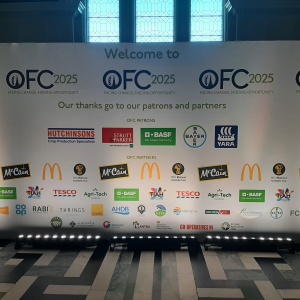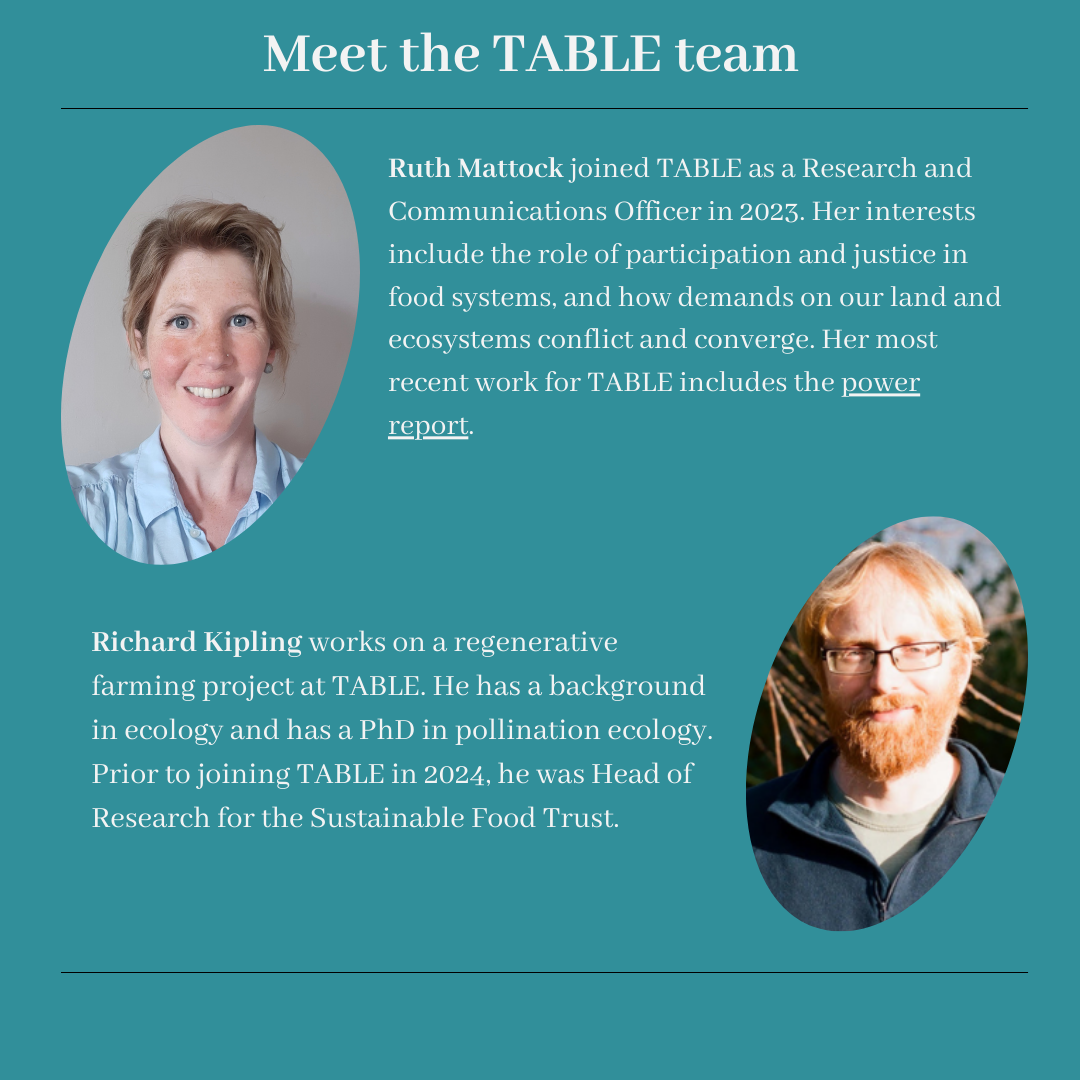
In early January, the TABLE team were out in force for two of the biggest farming events in the UK: the Oxford Farming Conference and the Oxford Real Farming Conference. Taking place at the same time, these two events represent very different perspectives, reflecting not only the divergence in food and farming debates, but the consensus, too. In this edition of FODDER, I talk to TABLE researchers, Ruth Mattock and Richard Kipling who attended the two conferences.
A tale of two farming conferences:
In early January, the TABLE team were out in force for two of the biggest farming events in the UK: the Oxford Farming Conference and the Oxford Real Farming Conference. Taking place at the same time, these two events represent very different perspectives, reflecting not only the divergence in food and farming debates, but the consensus, too.
The Oxford Farming Conference, held annually since 1936, is the incumbent, and could be described as the more ‘conventional’. This year it was sponsored by the potato chip company McCains and agri-chemical firm Bayer, and included debates on whether ‘UK agriculture needs more grazing livestock, rather than fewer, to be truly sustainable’ and ‘the global challenges for food and climate’.
Meanwhile, the Oxford Real Farming Conference – somewhat provocatively named – was set up in 2010 as an alternative, for the UK's agroecological food and farming movement. It included sessions on ‘how to sell your produce directly to a localised market’, ‘farming in Palestine’ and ‘transforming land relations’.
We found this a fascinating opportunity to see two such distinct events and audiences alongside each other, and a much-needed reminder of the different perspectives.
In this edition of FODDER, I talk to TABLE researchers, Ruth Mattock and Richard Kipling who are both working on our regenerative agriculture project HYPERLINK, and who attended the two conferences. I ask them about their experiences, the differences, and how the make-up of each event reflects their different needs and power as incumbent and under-dog.

TABLE: What was the energy like at both conferences? Can you tell me a bit about the sessions and the audience?
Ruth: I attended the Oxford Farming Conference, the first time for me, and it was much more corporate. It tends to attract more of a big cheese crowd and speakers – I met policymakers, lots of farmers, legal experts in land and others.
It’s a very focused conference; topics included precision breeding, alternative energy in tractors, regenerative dairy and a few more socially targeted ones like urban food poverty and mental health in farming.
Richard: ORFC was set up as a counter conference and that definitely comes across. There's a wide range of people with lots of diverse ideas, from small holders and small scale producers to campaigning organisations as well as academics and researchers mixed into that. There isn't so much of a corporate presence although there are people who work in the corporate supply chain who are trying to be more sustainable.
It's a melting pot of different people and there’s a very inclusive feel to it.
TABLE: Why did you attend?
Ruth: In September, Richard and I started a one year project looking into what a shift to regenerative agriculture would mean for our food system as a whole. In short, we’re reckoning with regeneration, exploring the different versions of the term – and because these two conferences are so distinct, it was a perfect opportunity to investigate these different perspectives.
TABLE: What were your main takeaways?
Richard: At ORFC, there was a feeling that all these different alternative visions need to find ways to work together and present a tangible, unified vision if they're going to get transformational change.
There was also a feeling that food systems and biodiversity are actually getting to a critical point where it's now or never and we're at a point where soon there might not be a way back.
I was less conscious of people critiquing others in different parts of that sustainability movement and more of people asking how do we actually achieve the change we want?
Ruth: At OFC I noticed there was a lot of focus on risk, and latent anger from farmers having to hold that risk evidenced by a number of protests against the government in Oxford that week. In reaction to this, there was a message of ‘farmers are great and underappreciated’ but I felt this narrative is taken up by stakeholders to assuage this anger without necessarily engaging with the structural reasons why farmers are holding too much risk.
TABLE: What struck you as the main difference between the two conferences?
Ruth: Content aside, the way the conferences are set up involve a completely different approach to decision making and expectations about who is in the room. We just published a report on Power in the Food System and it found that processes have a big impact on the way power plays out and how you’ve got to build decision-making diversity and room for different perspectives into your processes. I think the format of OFC doesn’t quite fit that, even in terms of who gets to ask questions in the sessions.
At OFC, the conference directors are the chairs of every session, they're the speakers between every kind of program event – so they contain the messaging themselves. Whereas at ORFC, you won't see much of the conference organisers because they're doing the organising on the ground. Likewise, my impression is that OFC is completely commissioned, whereas the ORFC has this big process over proposals.
One of the speakers at OFC was Ollie Hicks, an explorer and endurance athlete. For me, it was interesting that this is what was valued – someone who had shown great solo determination and resilience but with no close links to farming.
TABLE: To what extent do the two conferences represent very different needs and goals?
Richard: If the world already aligns with your view, you want a conference that showcases what you're doing, helps spread best practice and promotes how you're working to do the positive thing, while reinforcing that this is the way of doing things. From an alternative perspective you need the conference to bring people together to share their experiences of struggle and of what works, what might work and ways to challenge and test the status quo. In the space of a counter movement, you have to be much more creative about your strategy.
Ruth: Even the attendance of the two conferences speaks volumes. We might assume that the some 1,800 people at ORFC is a large proportion of the total body of farmers in the alternative space. Whereas OFC only has 800 because they don’t need to be changing a great body of minds. They have a much more singular set of messages; it's sort of an absorption into this single message rather than creating a shared purpose or movement.
While OFC was a single track of sessions – no more than one or two at the same time, ORFC had between 10 and 19 parallel sessions at any one point. This felt like a such a vivid demonstration about diversity of ideas versus a single message
TABLE: Do you think there should be more crossover between the two conferences?
Richard: There are people who say the conferences should reach out more, but they both have their own social and promotion role, and each needs their own space. But I think there’s a need to have more spaces where the two groups can engage constructively.
Ruth: It’s novel to see two conferences on the same topic at the same time in the same town, but separate. People from one conference drop in to the other and there's maybe an increasing trend of farmers who have previously presented at ORFC, are engaging with OFC because they see that as a way to move their argument and methods into the mainstream.
Richard: That’s one theory of change – trying to mainstream innovative practices – or there’s the argument that you’re just giving ideas to the people with the power to cement their position, cherry pick the best perspectives from the counter movement and avoid more radical change.



Post a new comment »